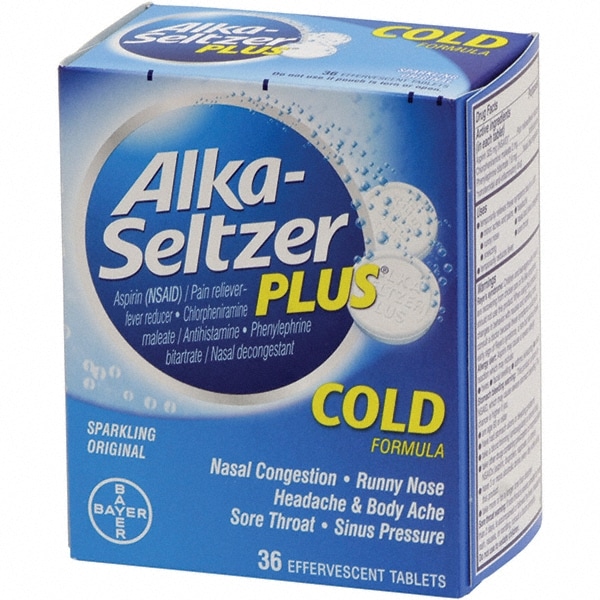What is Alka-Seltzer?
Alka-Seltzer is an anti-inflammatory and pain relief medicine. It relieves minor aches, inflammations, pains, fevers, stomachache, heartburn, and acid reflux. It was first introduced by Dr. Miles Medicine Company, Elkhart, Indiana, USA.
Alka-Seltzer originally contained three active ingredients: anhydrous citric, sodium bicarbonate, and aspirin acetylsalicylic acids. The effervescent interactions of citric acid and sodium bicarbonate with water make effective antacids for neutralizing stomach acid.
Alka-Seltzer has many other products that contain different active ingredients. The non-aspirin antacid Alka-Mints entered the market in 1994 and quickly became popular. Bayer Schering Pharma AG in Germany manufactured Alka-Seltzer starting in 1978.
How Alka-Seltzer Works
Alka-Seltzer combines three medications. An antacid that neutralizes stomach acid by reducing indigestion and stomach upset, sodium bicarbonate and citric acid are both available. The nonsteroidal anti-inflammatory drug NSAID Aspirin relieves swelling and pain by blocking the proteins that cause inflammation in your body.
Side Effects
Alka-Seltzer could have the following side effects
- Dysrhythmias
- Hypotension
- Tachycardia
- Agitation
- Cerebral edema
- Coma
- Confusion
- Dizziness
- Headache
- Intracranial or subdural hemorrhage
- Lethargy
- Hives
- Rashes
- Amplifying gastric It can lead to ulcers and gastrointestinal pain.
- Prolonged prothrombin time
- Palpitations
- Sedation
- Depression
- Tremors
- Irritability
- Insomnia
- Euphoria
- Hemolytic anemia
- Thickening in bronchial secretions
- Restlessness
- Headache
- Hypertension
- Vasoconstriction of the visceral and peripheral blood vessels
Some individuals may experience symptoms such as diarrhea, nausea, vomiting, stomach pain, or abdominal pain. These patients should take Alka Seltzer before or after eating. Also, bleeding from the GIT or ulceration has been described. If you experience stomach or intestinal bleeding, please get in touch with your doctor immediately.
Specific Alka-Seltzer preparations with Acetaminophen, in particular, may lead to liver dysfunction. Alka-Seltzer administration has also been associated with an increase in the time it takes to stop bleeding.

Allergy reactions can also occur, including skin rashes and swelling of the lips, tongue, and throat, as well narrowing the airways. Some predisposed patients may experience angioedema or bronchospasm.
Can Patients With Liver Disease Use Alka-Seltzer Safely?
Acetaminophen, the active ingredient in many Alka-Seltzer medications, is mainly broken down in the liver. Small amounts of the medicine can be converted to minor metabolites by minor pathways. It can lead to methemoglobinemia or hepatotoxicity. Due to increased activity in minor metabolic pathways, patients with hepatic impairment could be at greater risk of toxic effects.
Patients who took Acetaminophen have been diagnose with severe liver injury. No acetaminophen treatment should be provided to patients with liver disease.
How Does It Work In The Body?
Many Alka-Seltzer products contain different combinations and formulations of active ingredients. Aspirin, chlorpheniramine, phenylephrine, Acetaminophen, citric acid, sodium bicarbonate, and phenylephrine are all present in Alka-Seltzer formulations.
Aspirin acts as an irreversible inhibitor of prostaglandin synthesis and platelet accumulation. In addition, it is more effective than other compounds of salicylic acid. Acetylsalicylic acids are different from other NSAIDs like diclofenac or ibuprofen, which can be reversed. Analgesic, antipyretic, and anti-inflammatory effects can cause by inhibiting prostaglandin production.
It also acts as an antagonist of histamine’s constrictor effects on respiratory smooth muscles. It is an antagonist of histamine H1 and can treat allergic reactions like hay fever, urticaria, and rhinitis. The vasoconstrictor drug phenylephrine has decongestant properties and relieves upper respiratory tract irritation symptoms. It reduces inflammation of the mucous membranes and decreases tissue hyperemia.
Phenylephrine, a sympathomimetic drug, acts primarily as an agonist for a1-adrenergic and other receptors. It has some effects also on beta-adrenergic and gamma-adrenergic receptors. Acetaminophen inhibits peripheral pain impulse generation and may inhibit prostaglandin production within the CNS.
It reduces fever by blocking the hypothalamic heat regulation center. Doxylamine, an antihistamine drug, competitively blocks histamine binding to H1 receptors. It is a potent antimuscarinic agent and can penetrate the CNS, which could cause sedation.
Sodium bicarbonate and citric acid are two common antacids used to reduce stomach acid. As a cough suppressant, dextromethorphan acts on the medulla, the brain region responsible for controlling the cough reflex.
Alka-Seltzer Interactions
- Aspirin can cause stomach bleeding. It can be worse by drinking alcohol. One drink of alcohol equals 4 ounces of wine, 12 ounces of beer, and 1 ounce of hard liquor, gin, or whiskey.
- While taking this medicine, avoid using other pain or arthritis medicines such as Motrin, ibuprofen Advil or Motrin, naproxen Aleve or ketoprofen, Oruvail or indomethacin Indocin Celebrex, Daypro or Relafen.
- Don’t take any other medications that contain Aspirin.

